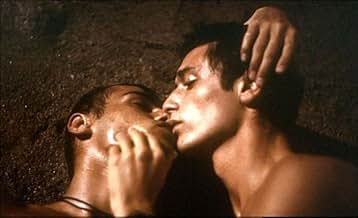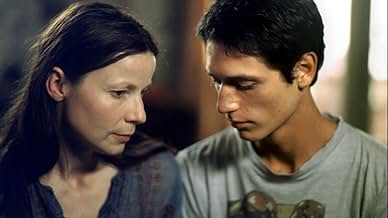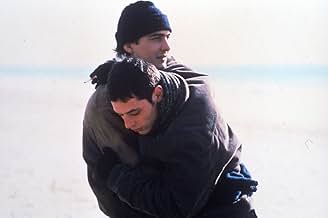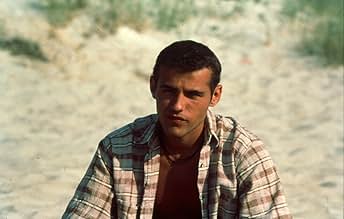Mathieu, de 18 anos, passa o verão na casa de verão de sua mãe, na Bretanha. Na praia, ele conhece Cédric, um garoto da sua idade. Uma história de amor começa entre os dois meninos.Mathieu, de 18 anos, passa o verão na casa de verão de sua mãe, na Bretanha. Na praia, ele conhece Cédric, um garoto da sua idade. Uma história de amor começa entre os dois meninos.Mathieu, de 18 anos, passa o verão na casa de verão de sua mãe, na Bretanha. Na praia, ele conhece Cédric, um garoto da sua idade. Uma história de amor começa entre os dois meninos.
- Direção
- Roteiristas
- Artistas
- Prêmios
- 1 indicação no total
- Mathieu
- (as Jeremie Elkaïm)
- Cédric
- (as Stephane Rideau)
- La psychiatre
- (as Rejane Kerdaffrec)
Avaliações em destaque
Mathieu (handsome and gifted Jérémie Elkaïm) is visiting the seaside for a holiday, a time to allow his mother (Dominique Reymond) to struggle with her undefined illness, cared for by the worldly and wise Annick (Marie Matheron) and accompanied by his sister Sarah (Laetitia Legrix): their distant father has remained at home for business reasons. Weaving in and out of the first moments of the film are images of Mathieu alone, looking depressed, riding trains, speaking to someone in a little recorder. We are left to wonder whether the unfolding action is all memory or contemporary action.
While sunning at the beach Mathieu notices a handsome youth his age starring at him, and we can feel Mathieu's emotions quivering with confusion. The youth Cédric (Stéphane Rideau) follows Mathieu and his sister home, continuing the mystery of attraction. Soon Cédric approaches Mathieu and a gentle introduction leads to a kiss that begins a passionate love obsession. Mathieu is terrified of the direction he is taking, rebuffs Cédric's public approaches, but continues to seek him out for consignations. The two young men are fully in the throes of being in love and the enactment of the physical aspect of this relationship, so very necessary to understanding this story, is shared with the audience in some very erotic and sensual scenes. Yet as the summer wears on Mathieu, a committed student, realizes that Cédric is a drifter working in a condiment stand at a carnival. It becomes apparent that Cédric is the Dionysian partner while Mathieu is the Apollonian one: in a telling time in architectural ruin Mathieu is excited by the beauty of the history and space while Cédric is only interested in the place as a new hideaway for lovemaking.
Mathieu is a complex person, coping with his familial ties strained by critical illness and a non-present father, a fear of his burgeoning sexuality, and his nascent passion for Cédric. Their moments of joy are disrupted by Cédric's admission of infidelity and Mathieu's inability to cope with that issue and eventually they part ways. Time passes, family changes are made, and Mathieu drifts into depression including a suicide attempt. The manner in which Mathieu copes with all of these challenges and finds solace, strangely enough, in one of Cédric's past lovers Pierre (Nils Ohlund) brings the film to an ambiguous yet wholly successful climax.
After viewing the film the feeling of identification with these characters is so strong that the desire to start the film from the beginning now with the knowledge of the complete story is powerful. Lifshitz has given us a film of meditation with passion, conflicts with passion's powers found in love, and a quiet film of silences and reveries that are incomparably beautiful. The entire cast is superb and the direction is gentle and provocative. Lifshitz is most assuredly one of the bright lights of film-making. In French with English subtitles. Highly Recommended. Grady Harp
Told by director Sebastian Lifshitz and writers Stephane Bouquet and Lifshitz through a series of vignettes--often presented in a nonsequential timeline--the unfoldment provides some work on the part of the viewer to position these disjointed fragments together.
However, the basic scenario is so simple that the unfoldment does unite in post-reflection. It is an interesting tale, made plausible by two fine performances by the leads.
Jeremie Elkaim as Matthiew evokes a slightly moody, troubled youth, longing for affection, and willing to give of himself in a new relationship. Elkaim's work beautifully conveys Matthiew's need for companionship and for escape from a staid and mundane domestic environment.
Stephane Rideau presents yet another of his remarkable performances as Cedric. Rideau immerses himself in the role so skillfully that his craft brilliance is taken for granted. As close to the late James Dean as has been seen recently, Rideau takes his place in the Alain Delon legacy as one of France's leading young actors. Rideau possesses an arresting countenance: even his pointed ears, protruding chin, an off-centered eye, and crooked lips seem to contribute to his handsomeness. His Cedric is non-intellectual, expressing primitive emotions in his approach to life; yet, his ardor for Matthiew rings undeniably genuine and true.
The rest of the cast of "Presque rien" contribute to this slice-of-life tale, and we are pleased to have an opportunity to glimpse fragments of a both playful and poignant summertime romance.
Director Sebastien Lifshitz slices the narrative, then pieces it together in a way which is at first confusing but which ultimately adds much to the emotional tone of the film. The meeting and parting of two boys in their late teens is related without offering much in the way of a clear explanation as to how or why. The emphasis being on the troubled emotional journey one of them undergoes as a result of the unexpected love relationship that develops.
Besides his keen cinematic eye, Lifshitz's major success is eliciting from both Jeremie Elkaim and Stephane Rideau totally convincing performances. There's not one false note sounded. The smaller parts too are handled well.
A deeply moving, beautifully played, complex film. One that certainly warrants more than one viewing.
The film's fractured narrative -- which is comprised of lengthy flash-backs, bits and pieces of the present, and real-time forward-movement into the future -- is a little daunting. Director Sebastien Lifshitz doesn't signal which time-period we are in, and the story line can be difficult to follow. But stick it out: The film's final 45 minutes are so engrossing that you won't be able to take your eyes off the screen. By turns heart-breaking and uplifting, this film ranks with "Beautiful Thing" as must-see cinema.
Você sabia?
- CuriosidadesJérémie Elkaïm was 21 years old and Stéphane Rideau was 23 years old when they played the teenagers 'Mathieu' and 'Cédric'. Elkaïm would later play yet another gay teenage character in the series 'À cause d'un garçon (2002)' and Rideau would play the aging hustler 'Vassili' in 'Notre paradis (2011)'.
- Citações
Cédric: [at the beach] Hey, Mathieu.
Mathieu: Please go away.
Cédric: Why?
Mathieu: So they don't see us together.
Cédric: Are you ashamed or what?
Mathieu: No, I just don't want any trouble.
Cédric: What trouble?
Mathieu: Can't you just leave?
Cédric: You think I'm stupid?
Mathieu: Just fuck off!
Cédric: What, fuck off?
- Trilhas sonorasWise Mans Blues
Written by Perry Blake and Glenn Garrett
Performed by Perry Blake
From Perry Blake's album "Still Life"
Courtesy of Sony - ATV Music Publishing France
Principais escolhas
- How long is Come Undone?Fornecido pela Alexa
Detalhes
Bilheteria
- Faturamento bruto nos EUA e Canadá
- US$ 326.484
- Faturamento bruto mundial
- US$ 326.484
- Tempo de duração
- 1 h 40 min(100 min)
- Cor
- Mixagem de som
- Proporção
- 1.85 : 1

























